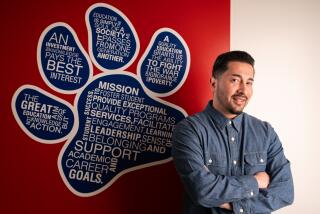Deafness Educator’s Replacement Picked
- Share via
NORTHRIDGE — A federal education official has been selected to head the prestigious National Center on Deafness at Cal State Northridge, succeeding Herb Larson, who is retiring after a 42-year career in education for the deaf.
CSUN officials said they hired Merri C. Pearson, who supervised more than $61 million in federal grants as a program officer at the U.S. Department of Education and taught at Gallaudet University, the nation’s oldest university for the deaf. A formal announcement is expected today.
Pearson, who is hearing-impaired and signs fluently, can hear speech, unlike Larson, who is profoundly deaf. She will be the center’s first female director and at 32, its youngest.
As director, Pearson will continue CSUN’s nationally recognized system of mainstreaming hearing-impaired students by supplying and training interpreters, technological assistance and tutors.
“I am young; I am a teacher,” she said. “I am not a Wonder Bread educator. I think diversity is important--we all have a lot to learn from each other.”
Pearson is expected to use her contacts in Washington, D.C., to increase funding for the CSUN program, which has an annual budget of $2 million. She will also coordinate a federally funded network of similar support programs at mainstream colleges and universities in California, Idaho, Washington, Oregon, Colorado, Alaska, New Mexico, Nevada, Wyoming, Utah and Arizona. Her salary will be about $85,000 a year.
Pearson’s admirers say her unusual blend of experience in deaf and mainstream educational settings make her a good fit at the National Center on Deafness, where such a mix of experiences is encouraged.
“Merri has supervised small groups of people, but not such a large staff as Herb has put together,” said Ramon Rodriguez, a director in the U.S. Department of Education’s special education branch. “They have a staff of 200 there. The buck is going to stop with her.”
Harvey Liebergott, who also worked with Pearson in Washington, said her biggest challenge will be to “depoliticize the deaf community,” referring to ongoing debates about the best way to educate hearing-impaired students.
At Gallaudet, where Larson received his bachelor’s degree, sign language is the lingua franca, or common language. And deaf culture--rather than assimilation into the hearing world--is emphasized.
“It’s a utopia,” Larson said through an American Sign Language interpreter. “It’s nice, but is it better? That’s debatable.”
Diverging from Gallaudet’s approach, the National Center on Deafness was founded in 1972 to provide services that would enable hearing-impaired students at CSUN to take classes with the rest of the student population. Each semester, about 250 hearing-impaired students use services provided by the center, Larson said.
“We want our students to have access to everything on campus,” Larson said. “I think deaf students have to have the ability to work and compete with hearing students.”
Said Pearson: “Gallaudet is a place to go to be with deaf people as you continue your education. ‘It’s more of an isolated environment than CSUN, where the deaf community is part of a larger community. In an ideal world, I would like my students to have both experiences.”
Pearson, who will leave for London this week to work as a consultant on an international civics program, grew up at a school for the deaf and blind in Montana. Her father joined the school as a teacher and administrator after her hearing was damaged by meningitis at age 3.
Pearson received her bachelor’s degree at Central Washington University, her master’s at the University of Puget Sound and is finishing her doctorate at George Washington University.
She has worked as a sign language interpreter for private corporations, a teacher at several universities and an administrator in the office of of Washington state’s superintendent of schools. Most recently she oversaw federal grants to nearly 400 special education and independent living programs for the disabled.
In a meeting last week with several hearing-impaired students, Larson said Pearson was hired because of her “poise, references and resume.”
Students who attended Pearson’s interviews agreed that she was the most qualified candidate. Members of the search panel said they also were impressed by Pearson’s contacts around the country and her fund-raising expertise.
“She knows where the money is,” Rodriguez said. “She’s going to follow the money.”
More to Read
Sign up for Essential California
The most important California stories and recommendations in your inbox every morning.
You may occasionally receive promotional content from the Los Angeles Times.













